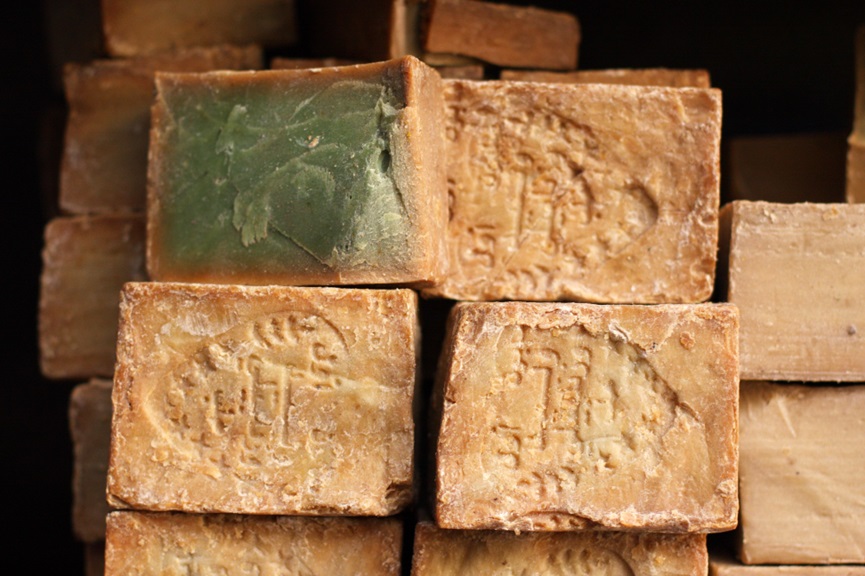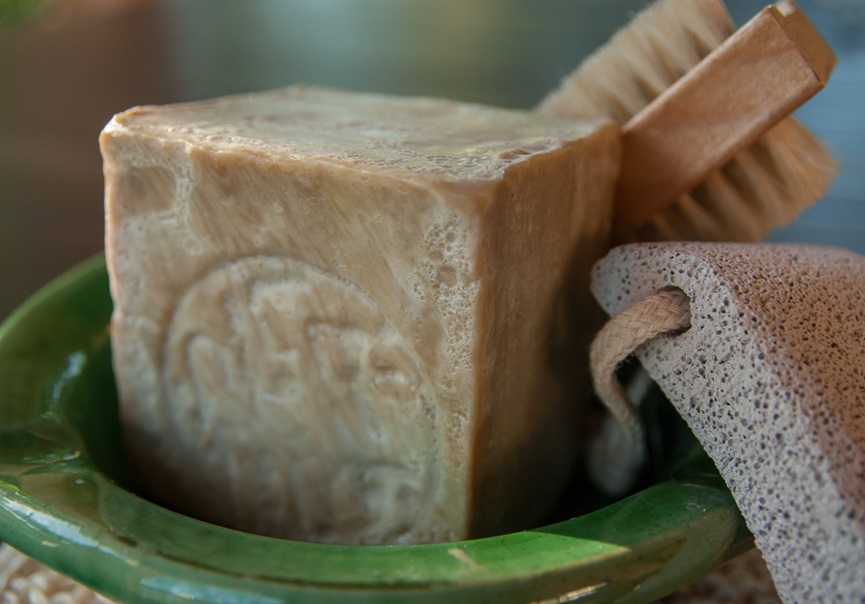Our Soaps
An Introduction To Aleppo Soap (Savon d'Alep)

Aleppo Soap has many synonyms - Savon d'Alep, Laurel Soap, Syrian soap, Alep Soap, Ghar Soap (Ghar is the Arabic word meaning 'laurel'). In Arabic it is called Sabun Ghar or Sabun Halabi.
However people choose to refer to this iconic soap associated with the city of Aleppo, Syria, it is certainly unique and boasts exceptional properties.
Aleppo Soap is a completely natural, handmade, hard bar soap, containing no additives, artificial colours or preservatives renowned for its purity and the host of benefits it offers.
Aleppo Soap is classified as a Castile soap as it is a hard soap made from olive oil and lye. In many respects, Aleppo Soap is similar to Castile Soap, Nablus Soap or Marseille Soap but what separates Aleppo Soap from these is the inclusion of bay laurel oil/ laurel berry oil, which is added to the olive oil usually to constitute between 5% and 40% but sometimes up to 70%.
Aleppo soap is a gentle, natural soap, recommended by dermatologists worldwide. Traditionally, Aleppo Soap is made from olive and laurel oil, stirred in copper cauldrons.
Aleppo soap is 100% natural, antiseptic, soothing, emollient, moisturising and hypoallergenic. It is composed exclusively of olive oil, oil of bay laurel, soda and water, according to the traditional recipe and production methods.
The oil of bay laurel is a precious oil boasting great virtues and the presence of olive oil brings significant benefits.

If you plan to buy Aleppo Soap, you should consider its composition, especially the percentage of bay laurel oil in the soap.
- Between 5% and 15% Bay Laurel Oil Content: This Aleppo Soap is recommended for dry and sensitive skin
- Between 15% and 25% Bay Laurel Oil Content: This Aleppo Soap is recommended for combination skin
- Between 25% and 70% Bay Laurel Oil Content: This Aleppo Soap is recommended for oily skin
Aleppo Soap (Savon d'Alep) At A Glance

- Aleppo Soap originates from the ancient city of Aleppo, Syria
- Rich cultural and historical significance
- Dates back centuries
- Traditional artisan production techniques
- A versatile multi-purpose soap
- 100% Natural & Vegetal
- Health Benefits: soothing, moisturising and healing
- Vegan-friendly
- Perfume-free, preservative free, colour free
- Enriched with Olive and Bay Laurel Oils
- Soap recommended by dermatologists world-wide
- Antiseptic, soothing, emollient, moisturising and hypoallergenic
- Cruelty-Free: Tested on friends, not animals
- Sustainable: natural, totally biodegradable soap product
- Aleppo Soap floats in water due to the oil composition and lengthy drying process
Aleppo Soap Characteristics

Appearance
Initially the soap a traditional Aleppo soap appears green but as it dries it develops a yellow-brown colour on the outside, a sign of its prolonged drying, while the inside reveals an emerald green, evidence of the natural oils. Authentic Aleppo Soap will always bear a master soapmaker’s seal, a stamp that guarantees authenticity and quality
Scent
Aleppo Soap has a distinctive natural earthy fragrance with bay leaf and olive oil notes and hints of wood and spice
A History Of Aleppo Soap (Savon d'Alep)

The origins of Aleppo Soap are shrouded in mystery but it is widely believed the history of Aleppo Soap dates back more than 5000 years originating in the city of Aleppo, Syria. Aleppo Soap is largely considered to be the root of the hard soaps used today around the world.
Unverified claims of its great antiquity abound, such as its supposed use by Queen Cleopatra of Egypt and Queen Zenobia of Syria.
Although it has been claimed that soap-making was introduced to the West from the Levant after the First Crusades, in fact, soap was known to the Romans in the first century AD and Zosimos of Panopolis described soap and soap-making in c.300 AD.Aleppo Soap (Savon d'Alep) Ingredients
Sodium Olivate (Olive Oil), Sodium Laurus Nobilate (Laurel Berry Oil), Aqua (Water).
Aleppo Soap is made with olive oil, the oil of the laurel berry (zeit ghar), water, and lye (sodium hydroxide). The concentration of laurel oil (typically between 5% and 20% but sometimes 40% and even as high as 70%) determines the quality and cost of Aleppo Soap.
The higher the laurel oil content, the higher the quality and price. Laurel Berry Oil being so precious and sometimes costing over £100 a litre means it’s a very expensive soap to produce. The higher the percentage of laurel berry oil content, the more moisturising and nourishing the soap is.
For those with sensitive skin, a lower percentage of laurel berry oil (around 12%) may be advised. For people with dry or very dry skin, Aleppo Soap with a higher laurel oil content, up to 70%, may be more beneficial.
In the 20th century, with the introduction of cold process soap making, soap artisans from Aleppo began introducing a variety of herbs and essential oils into their locally produced soaps and there are now many modern Aleppo Soap variants.
Aleppo Soap (Savon d'Alep) Uses
Aleppo Soap is pure, rich and hydrating, nourishing and healing and has been used for centuries in the Middle East. It can be used daily for washing and shampooing, applied as a face mask, used as a shaving cream and utilised for bathing infants and babies.
Known for its gentle properties, Aleppo Soap is recommended for sensitive skin including babies and children. The soap’s key ingredients, Olive Oil and Laurel Oil (also known as bay laurel oil), offer moisturizing and antibacterial benefits.
Olive oil hydrates, moisturizes, and nourishes dry, flaky skin, contributing to the soap's purifying effect by maintaining healthy skin.
Laurel oil is an effective cleanser, possessing antimicrobial, antifungal and anti-itching properties. Possessing antibacterial and antifungal properties, it helps manage skin problems like eczema, psoriasis, and acne. It can also calm redness, irritation and inflammation, further enhancing the soap's purifying action.

- Daily Cleansing – used for body & face washing
- Natural Shampoo – particularly for oily hair or dandruff
- Face Mask – can help nourish, minimize imperfections and rejuvenate
- Shaving Cream – provides a smooth shave preventing skin irritation
- Skin Conditions – managing and soothing skin issues such as eczema, acne and psoriasis
- Laundry Soap – the soap or its flakes can be used for washing materials
Aleppo Soap (Savon d'Alep) Benefits
Aleppo soap is a timeless, natural soap, cherished for centuries for its remarkable benefits. The unique blend of olive oil and laurel berry oil offers a range of advantages, from moisturising and nourishing the skin to providing gentle cleansing and healing for sensitive skin types.
By virtue of its natural oil composition, Aleppo Soap cleans the skin without aggression, nourishes through the properties of olive oil, purifies thanks to the oil of bay laurel and preserves the hydrolipic film of the skin. Here are some of the numerous benefits that Aleppo Soap brings:
- Gentle Cleansing - For all skin types including sensitive skin & scalps, Aleppo Soap cleanses and purifies without stripping the skin of its natural oils.
- Skin Conditions - Soothing, anti-bacterial & anti-inflammatory, and gently exfoliating, Aleppo Soap hydrates the skin and can help relieve itching caused by acne, psoriasis and eczema. This fragrance-free soap is ideal for relieving irritations and soothing skin conditions.
- Moisturising - emolliating, protecting, moisturising and lubricating the skin. Olive Oil contains Vitamin E, which has anti-oxidant properties and protects the skin from harmful sunlight and air pollutants.
- Biodegradable & Sustainable - Production in line with centuries-old tradition unlike conventional soap production that may involve the use of synthetic chemicals, which can pollute waterways, harm aquatic life and contribute to environmental degradation.
- Hair Strengthening - Contains iron, calcium and sodium which helps maintain hydration in the hair and strengthen hair follicles to prevent hair loss.
- Anti-dandruff - used as a shampoo, Aleppo Soap helps moisturise the scalp and limit flaking.
- Anti-ageing - Rich in antioxidants, the soap removes impurities without stripping away natural moisture and combats the signs of ageing.
- Antimicrobial - Laurel Oil boasts antibacterial and antifungal properties.
- Hydration - Olive oil is a natural moisturizer that helps to hydrate and nourish the skin. It is particularly beneficial for dry or sensitive skin.
- Baby & Children’s Sensitive Skin - Aleppo Soap is so gentle that it is suitable for all skin types, even the most fragile.
- Sensitive Skin Use - Dermatologists recommend Aleppo Soap for: dry skin, itching and skin problems including eczema, psoriasis, acne, and cradle cap. It can be used for the faces of babies, infants and the young and delicate skin, itchy scalp etc. Suitable for all skin types, Aleppo Soap is beneficial for dry, sensitive and reactive skin as well as for atopic or irritated skin.
- Purification - Aleppo Soap’s antiseptic properties effectively remove bacteria, fungi and viruses. It thus contributes directly to excellent hygiene by eliminating dead cells and impurities.
